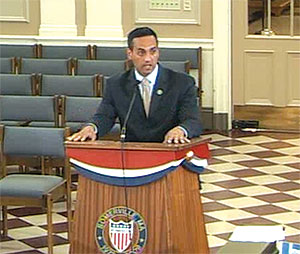
Mayor Curtatone voiced strong opposition to the Board of Alderman plan for campaign finance reform, suggesting that he would veto the law if necessary.
By Jim Clark
The Board of Alderman voted on a long-discussed law that would limit campaign contributions by property developers to $250, compared to the current limit of $500, at last week’s general meeting on Thursday. The law affects those who develop 10,000 square feet or more in the city.
The aldermen took more than a year to study and discuss two versions of the campaign reform plan, one put forward by Mayor Curtatone, featuring measures that would restrict city employee contributions, and another fashioned by Alderman-at-Large and Board President William A. White, which focuses on limiting donations by developers. Additionally, each plan proposed placing restrictions on companies and individuals that sought to gain contracts with the city.
It was decided that a vote would be taken on the proposal put forward by Alderman-at-Large White. Voting in favor of the law were Aldermen Rebekah Gewirtz, Matt McLaughlin, Katjana Ballantyne, Mark Niedergang, Bill White, Tony Lafuente, and Dennis Sullivan. Those who voted against it were Aldermen Bob McWatters, Mary Jo Rossetti, Maryann Heuston, and Jack Connolly.
The law must be voted on and passed twice in order to take effect. While last week’s 7-4 vote in favor of the proposal set the stage for final passage in September’s vote on the matter, there was not a large enough majority of votes to avert a veto by the mayor, which he has said he would do. The Board lacked one vote in assuring that the mayor could not impose a veto on the law.
The mayor told the Board that he was in favor of finance reform, but he was concerned that the proposed law would impose too many restrictions and negatively affect those who would run for office as well as set the stage for the zoning and planning boards to become involved in political decisions
The mayor warned the Board that the law would negatively impact the ability of first-time candidates to get involved in the system.
Conversely, Alderman White argued that the political process was open to all, but that his concern was for developers who might exert undue influence and gain political power, thereby circumventing due process when it comes to zoning and planning decisions.
The law will be further debated and voted on again in September.


















Reader Comments